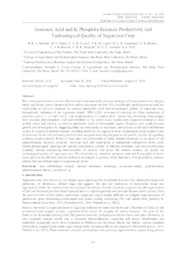Jasmonic acid and K-phosphite enhance productivity and technological quality of sugarcane crop.
Jasmonic acid and K-phosphite enhance productivity and technological quality of sugarcane crop.
Author(s): MOREIRA, B. R. de A.; VIANA, R. da S.; LISBOA, L. A. M.; LOPES, P. R. M.; FIGUEIREDO, P. A. M.; RAMOS, S. B.; BONINI, C. S. B.; TRINDADE, V. D. R.; ANDRADE, M. G. de O.; MAY, A.
Summary: Abstract: Plant resistance inducers are cost-effective and environmentally pleasing strategies of plant protection to mitigate biotic and abiotic agents threatening food safety and energy security. We, accordingly, present jasmonic acid and k-phosphite as low-cost strategies to enhance productive yield and technological quality of sugarcane crop. Exogenously treatment of the sugarcane variety SP81-3250 consisted of carrying out foliar application of jasmonic acid at 1, 1.5 and 2 ml L-1 and K-phosphite at 2, 4 and 6 ml L-1 before crop flowering. Interestingly, both systemic phytorregulator and foliar fertilizer at the lowest doses significantly improved contents of total soluble solids and sucrose, as well as productive yield of fermentable sugars. Jasmonic acid could promote growth and development by triggering either non-enzymatic or enzymatic mechanisms in the host self-defense system to support of external stresses, including herbivory by sugarcane-borer. K-phosphite could improve crop performance by not only releasing water-soluble inorganic ions like phosphorus and potash, but also by signaling synthesis of phytoalexins. Purity of cane juice and productivity of stalks sharply decreased, as the doses of the plant-resistance inducers increased. Jasmonic acid and k-phosphite at unbalanced endogenous levels could inhibit physiological ripening and specific enzymatical activity of alkaline invertases and sucrose-phosphate synthase, thereby influencing bioavailability of sucrose. The lower the sucrose content, the poorer the technological quality of sugarcane crop. The conclusion is, therefore, jasmonic acid and K-phosphite at lower doses prove to be effective induced resistance techniques to produce richer feedstock, with potential to produce ethanol fuel and refined sugar in sugar-energy plants.
Publication year: 2019
Types of publication: Journal article
Unit: Embrapa Environment
Keywords: Cana de Açúcar, Host self-defense system, Induced resistance, Induced resistance technique, Jasmonate-methyl, Jasmonic acid, Nutriente Mineral, Phytohormone, Plant-resistance elicitor, Potassium phosphite, Regulador de Crescimento, Resistência, Sacarose, Saccharum sp, Sucrose, Sucrose-phosphate synthase, Sugarcane, Sugarcane juice
Observation
Some of Embrapa's publications are published as ePub files. To read them, use or download one of the following free software options to your computer or mobile device. Android: Google Play Books; IOS: iBooks; Windows and Linux: Calibre.
Access other publications
Access the Agricultural Research Database (BDPA) to consult Embrapa's full library collection and records.
Visit Embrapa Bookstore to purchase books and other publications sold by Embrapa.

